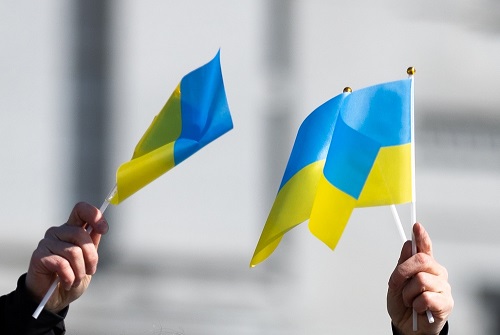

Dear Roadrunners,
I know many of you are closely following the violence in Ukraine, as am I. Many Americans are scared or confused, wondering whether the U.S. could directly engage militarily or if the conflict could spread to additional countries in Europe. The Russian invasion has been jarring to us all, even military experts such as myself who have been following the buildup to this moment for decades.
If you haven’t been following along, know that there is a long history between Russia and Ukraine. Russian President Vladimir Putin’s grievances go back to the breakup of the Soviet Union 30 years ago, which plunged Russia into a decade of poverty and was deeply humiliating to Soviet leaders. Putin has seethed over the steady expansion of NATO in eastern Europe, which he sees as a security threat to the boundaries of what he believes are historically Russian lands, including former Soviet territory such as Ukraine. The heart of NATO is the collective defense principle in Article 5 of NATO’s founding treaty, which considers an attack against a NATO country as an attack against all of them. This latest move is Putin’s attempt to forcibly claim the territory of Ukraine, which had not yet managed to join the protective NATO alliance like the Baltic countries bordering Russia did in 2004.
While U.S. intelligence suggested that Ukraine’s capital city of Kyiv could fall within days of Russia’s initial invasion, Ukrainians have mounted a much stiffer military resistance than Putin likely anticipated, even as nearly 700,000 Ukrainians have fled the country. This mounting refugee and humanitarian crisis is compounded by speculation about military escalation, increased U.S. and NATO support, and worry over the conflict spilling over into NATO countries or worse.
As a former undersecretary of the U.S. Navy and deputy assistant secretary of defense, I helped develop contingency plans for NATO and have weighed in on the Ukraine crisis on 9News, KOA Radio and Newsy in the past week. I will also join an informational panel with other MSU Denver experts next week to help Roadrunners and the greater Denver community make sense of all of this.
Ukraine Conflict in Context – A Presidential Pop-Up Panel
In collaboration with the Department of History and Denver Project for Humanistic Inquiry
- Moderator: Kim Klimek, Ph.D., professor, History
- Panelists:
- Janine Davidson, Ph.D., president
- Andrea Maestrejuan, Ph.D., associate professor, History
- Cristina Bejan, Ph.D., affiliate faculty, History
Monday, March 7 | 2-3 p.m.
JSSB Room 400 and Zoom webinar
*This event has reached its RSVP capacity for in-person attendance; please join through the Zoom link above.
As a reminder, we’ll also host one of the world’s leading experts on Russia and Europe at our March 16 President’s Speaker Series featuring Fiona Hill, Ph.D.
As the U.S. and other countries impose economic sanctions on Russia, Gov. Jared Polis has asked public institutions to ensure that Colorado’s dollars are not used to support the Russian government. MSU Denver has confirmed that its Foundation has no Russian-owned assets, nor does the University have any Russian-related grants, contracts or projects underway. We don’t have students studying abroad in either Russia or Ukraine currently either.
If you’re wondering what you can do on an individual level to help the people of Ukraine, you can give to credible organizations such as Rescue.org, which provides critical aid to displaced families. MSU Denver also offers mental-health resources to students and employees, and I encourage you to reach out using the information below if you need to.
We will continue to monitor the conflict in Ukraine closely and stand in solidarity with the people of Ukraine.
Sincerely,
Janine Davidson, Ph.D.
President
Mental Health Resources:
Students can receive free and confidential mental-health assistance from the Counseling Center (303-615-9988) and the Health Center at Auraria (303-615-9999, or 303-615-9911 after hours). The Student Care Center (303-615-0006) is also available, or you can contact MSU Denver’s CARE Team if you are concerned about the well-being of another student.
Faculty and staff members in need of such resources can access services and support through the Colorado State Employee Assistance Program. Call 303-866-4314 or complete the online form to make an appointment.
